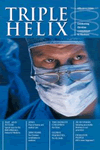Christian Choices in Healthcare is an outstanding collection of essays by senior Christian doctors, that has been widely distributed. Divided into two parts, Christian Vocation in Healthcare and Medical Ethics, the essays are solidly written and most are deeply grounded in Scripture.
Surgeon Alan Johnson writes an open letter from a professor to a medical student. What am I doing at Medical School? Where do I get extra stamina from? I'm scared of making contact with patients. What of the future? All these issues are addressed very well. John Wyatt, a paediatrician, tackles the issue of maintaining priorities as a Christian medical student and asks, 'Are you a spiritual schizophrenic?' Michael Jones writes about being a stressed doctor in a stressed society. I found his observation that even the Apostle Paul suffered from stress (2 Corinthians 11: 28-29) very amusing.
Medical students need career advice but few medical schools are good at providing it. In medical careers, Michael Webb-Peploe, cardiologist, discusses how the role of doctor within society is changing. He also proposes some useful criteria for choosing a specialty. It is vital to seek God's guidance through prayer and reading the Bible.
He concludes: 'Neglect of time spent in the presence of God (either alone or in the company of other Christians) lies at the root of many a spiritual shipwreck in early professional life.' Susan Clarke, nuclear medicine consultant, writes about women in medicine: a Christian perspective. She looks at the immense value of women in medicine and gives advice about the training years in women's careers.
Peter Saunders, now General Secretary of the Christian Medical Fellowship, opens up the second part of the book with a valuable discussion on making ethical decisions in medicine. What are medical ethics? Where do they come from? There are different bases for making such decisions and these are examined: gut feeling, reason, conscience, consensus, consequences, relativism and authority. How do you know God's will? What should you do when Christians disagree?
There then follows comprehensive discussions on issues of early life, abortion, human genetics and sexuality. Peter Lewis, pastor of Cornerstone Evangelical Church, Nottingham, writes a very clear essay on hope, healing and the charismatic movement. Andrew Fergusson, former CMF General Secretary, grapples with euthanasia and alternative medicine (subjects on which he is a considerable authority). Roger Moss, a psychiatrist, writes on demons. Finally, other issues at the end of life such as growing old and bereavement are discussed by George Chalmers who, very appropriately, a geriatrician.
Reviewed by:
Rachael Pickering
SHO in Orthopaedics
London































